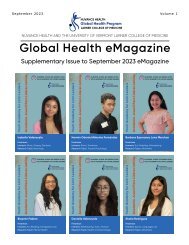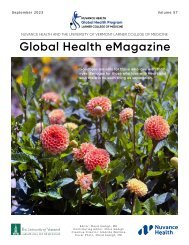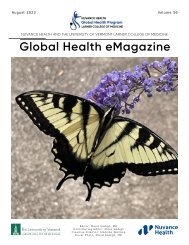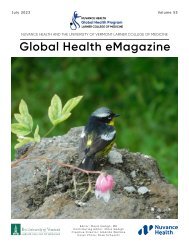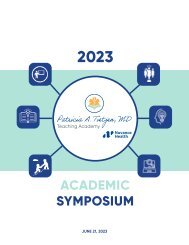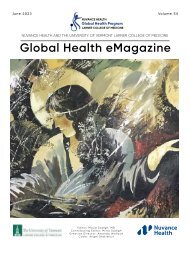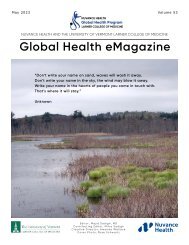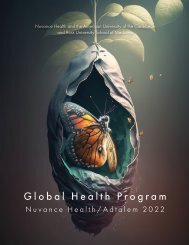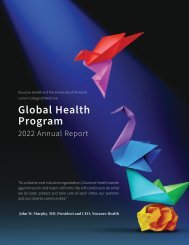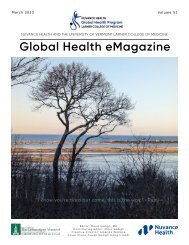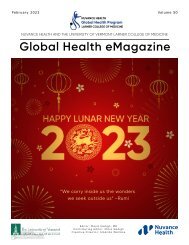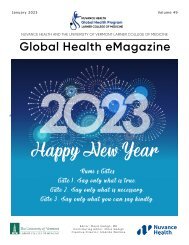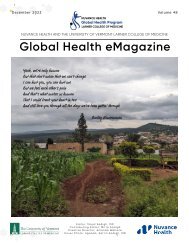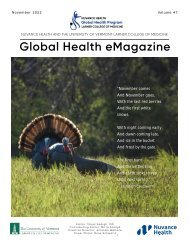eMagazine April 2023
Create successful ePaper yourself
Turn your PDF publications into a flip-book with our unique Google optimized e-Paper software.
OUR PEOPLE,<br />
OUR MISSION<br />
Global Health<br />
<strong>eMagazine</strong><br />
<strong>April</strong> <strong>2023</strong><br />
Perspectives<br />
Reports from the Field<br />
Highlights<br />
Reflections<br />
Nursing Division<br />
Women’s Health Education<br />
Reflections<br />
Karamoja, a land out of the world and my<br />
most invaluable University<br />
Written by Hossein Akbarialiabad, MD<br />
Karamoja, a very remote place where neither colonial powers nor the Ugandan<br />
government could control over past centuries, is home to a unique lifestyle. This<br />
area is technology repellent. There is little connection with the outside world.<br />
Sugar, salt, and oil are not used in the villages for cooking, while they still use<br />
wild grains. I traveled to the villages and warrior camps to further understand<br />
the culture. All individuals–women, children, elders, and even warriors–only<br />
consumed one meal daily.<br />
Hispanic/Latinx Community<br />
Ugandan Voices<br />
Innovation and Technology<br />
Our Beautiful Planet<br />
Art to Remind Us of<br />
Who We Can Be<br />
Video of the Month<br />
Announcement<br />
New Publications<br />
Article of the Month<br />
Welcome<br />
Among the Letters<br />
Congratulations<br />
Photo News<br />
Calendar<br />
Global Health Family<br />
Resources<br />
Previous Issues of<br />
the <strong>eMagazine</strong><br />
In villages, all families regardless of their income had one meal per day together;<br />
all consisting of wild grains and beer from local grass. The only piece of advanced<br />
technology in this society were AK-47 firearms to protect their cows. Further<br />
shocking was that people did not have mirrors–they could only recognize their<br />
face while looking at the water. When we were taking selfies together, villagers<br />
would not understand that it was their face in the picture.<br />
Prior to my journey, I studied a lot about Karamoja, learning basic vocabulary<br />
and what (not) to do. Surprisingly they called our car, “moving house” and the<br />
helicopter, “big bad” in their local tongue. When it comes to medicine, only local<br />
interventions were present and people had never seen manufactured pills. The<br />
children stared at me during my time there while practicing their local customs<br />
and fashion. At one point, a child touched me, yelled and scurried back to her<br />
mother, screaming, “Mzungu! Mzungu!” meaning “white! white!” in their local<br />
language. Some of the other children came and touched me as if making sure I<br />
was of the same species.<br />
After I somewhat adjusted to this new environment, I noticed a pure sense of<br />
humanity. I had a lovely stay thanks to Paul–my guide, and translator–who<br />
taught me how to grind the grains with rocks, cook the food using wild grains,<br />
and make baskets for storage using branches of local trees and grasses. I really<br />
9<br />
Reflections continued on next page >>




